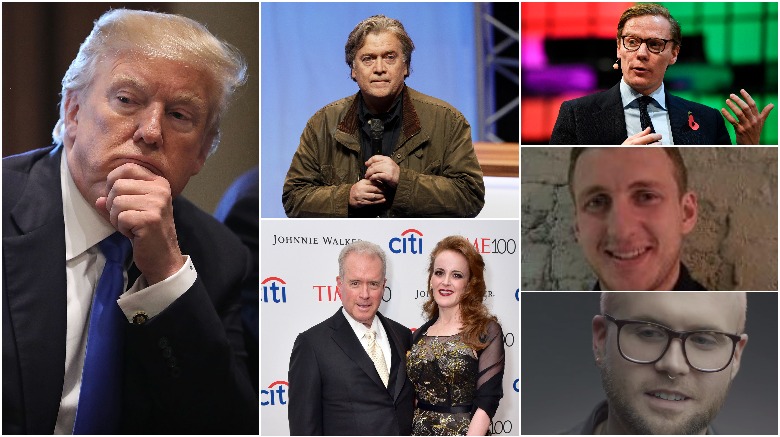
There isn’t a white board big enough to map it all out, but at the center of the psychological operations web behemoth incarnated by Steve Bannon and backed by Robert and Rebekah Mercer, is the now-whistleblower and brainchild of Cambridge Analytica and its connection to the 50 million Facebook files stolen: Christopher Wylie.
The revelation came this weekend through an explosive report from The Guardian after a year-long investigation with its source, “…the gay Canadian vegan who somehow ended up creating ‘Steve Bannon’s psychological warfare mindf*ck tool.’”
But also through the appearance of whistleblower Wylie himself on Twitter Saturday March 17 with his first tweet: “Here we go.”
On Monday, Rep. Adam Schiff (D-CA), the ranking member of the House Permanent Select Committee on Intelligence, sent a letter to Wylie asking him to testify as part of the committee Democrats’ “ongoing investigation into Russian interference in the 2016 election.” A release said Schiff and the committee’s minority members are looking for Wylie to testify “about the reported misappropriation of private data, as well as information determine where the date it was stored, how it was used, and with a third parties accessed and exploited the information, including in Russia.”
Russia, Facebook, Pres. Donald Trump, the Mercers, and Bannon all appear as threads running through Cambridge Analytica conceived by Wylie, 28, who was just 24 at the time an idea went from an objective theory to a concrete practice that infiltrated the lives of millions and likely swayed the 2016 US election and the incalculably significant Brexit vote.
Wylie told The Guardian, the Mercers and Bannon seized upon the research of Cambridge University professors led by Aleksandr Kogan, and Wylie’s idea to amass information “to bring big data and social media to an established military methodology – ‘information operations’ – then turn it on the US electorate.”
The Guardian’s Carole Cadwalladr found Wylie “lying low in Canada: guilty, brooding, indignant, confused” and at the time, Wylie told Cadwalladr that he had not spoken to anyone about Cambridge Analytica and his involvement, but he soon became her source.
Who is Christopher Wiley? How did the very young data savant become the omphalos of the labyrinth that was Cambridge Analytica? The latter, his creation, deeply woven into the fabric of investigations in the US and UK? It’s the story of one young man’s decision to pass on one job offer and take another with globally significant consequences.
Here’s what you need to know:
1. Whistleblower Wylie Was a Brilliant, Young, Gay & Bullied Canadian Who Left School at 16
Cadwalladr has communicated with Wylie countless times over the past year and knows how he ticks. He is her source and he shared his personal story and past with her and the team of editors and academics assigned to the report.
Wiley is a 28-year-old Canadian. He grew up in British Columbia. At a very young age, Wiley was assaulted by an unstable person and his parents, both doctors, tried as best they could to help him heal including lawsuits against the school where the abuse occurred, but early traumas don’t disappear.
Wiley, who is gay, was bullied in school. He has attention deficit hyperactivity disorder (ADHD) a neuro-developmental disorder which can be characterized in a number of different ways but usually involves hyperactivity. And he is dyslexic. Wiley left school at 16, The Guardian said, “without any qualifications” and at 17, had a gig in politics interning in the Parliament of Canada sans credentials or qualifications and it is not explained how he landed the role. It hardly matters because within the next year, Wiley studied data science and in specific targeting data and that skill landed him a job as the internet kid for the Liberal party in Canada.
In his 19th birth-year, Wiley, clearly very bright, taught himself how to code. By the time he was 20, across the pond he went and enrolled at the London School of Economics. While there, Wylie won the LSE. ‘Dechert Prize: Introduction to the Legal System.’
And maybe that’s where Wiley’s story really begins.
2. Wylie Read a Research Paper on Psychological Data Mining & It Would Alter His Trajectory
Described as a data genius, Wiley had an epiphany of sorts after reading a 2013 University of Cambridge research paper.
‘Computer-based personality judgments are more accurate than those made by humans,’ published by University of Cambridge psychology professors, Wu Youyou, Michael Kosinski and David Stillwell, the research, “compares the accuracy of personality judgment—a ubiquitous and important social-cognitive activity—between computer models and humans. Using several criteria, we show that computers’ judgments of people’s personalities based on their digital footprints are more accurate and valid than judgments made by their close others or acquaintances (friends, family, spouse, colleagues, etc.). Our findings highlight that people’s personalities can be predicted automatically and without involving human social-cognitive skills.”
Authors Kosinski and Stillwell both created psychological profile apps including a personality test for Facebook and found the way in to crawl around in the lives of millions.
Given he’d spent time helping party candidates, and opposition party candidates, to better target their electorate with the right messaging, the research on how personality traits could be a precursor to political behavior made a lot of sense to Wiley. And an idea hatched. So when he met with Bannon and the Mercers, there was no turning back.
3. Wylie Met Steve Bannon & the Mercers & Cambridge Analytics Was Born

GettySteve Bannon delivers a speech during the French far-right Front National (FN) party annual congress on March 10, 2018 in Lille, France.
About that trajectory. Perhaps his path really changed when he met Bannon who he described as “smart,” and then the all-powerful Mercer team of father and daughter, the latter who took to Wiley in part because he was gay; Wiley said both Rebekah Mercer and Bannon were enamored of “the gays.” Wylie said, they saw “us as early adopters” and referenced the Bannon-Milo Yiannopoulos relationship.
In any event, during the meeting in New York, the Mercers turned him on to SCL Elections (they’d already used a cousin modus operandi in hundreds of elections in underdeveloped nations) which would produce offspring Cambridge Analytica, paid for by Mercer who, besides being wildly wealthy, helped to create markets trading by algorithm. Wylie told The Guardian that the person with the cash in politics is usually not the brains of the operation but that was not the case with Mercer: “He wanted to understand the science. And he wanted proof that it worked.”
And to do that, Wylie needed data. Recall he had the benefit of the Cambridge research. The idea was to employ psychological operations, psyops, to alter what people think and believe not by trying to convince or persuade, but rather with controlled messaging, actually, disinformation and misinformation also known as fake news.
Wylie said Bannon and he spoke about how feminism fueled “the oppression that conservative, young white men feel.” And he said that Bannon and Breitbart owner Andrew Breitbart understood that, “to change politics you need to change culture. And fashion trends are a useful proxy for that. Trump is like a pair of Uggs, or Crocs, basically. So how do you get from people thinking ‘Ugh. Totally ugly’ to the moment when everyone is wearing them? That was the inflection point he was looking for.”
Wylie admits he hatched a plan to shanghai Facebook. But said Facebook knew it and did nothing to stop it.
4. Wylie Admits, That at Just 24, he Contrived a Plan to ‘Harvest’ Facebook

Whistleblower Christopher Wylie comes clean as ‘harvester’ of Facebook data for Cambridge Analytica.
Wylie told The Guardian—with plenty of backup including a letter from a Facebook attorney that confirmed Cambridge Analytica had stolen data—that for two months in the summer of 2014, more than 50 million Facebook profiles had been “harvested.” And Facebook knew it and did nothing. In speaking out, The Guardian saud, Wylie is breaking a non-disclosure agreement with Bannon and Mercer.
Three months before Donald Trump was elected president, Facebook told Wylie to delete the date that had been collected. He said he had, but there was no follow-up from Facebook and by 2016, the data had already been shared.
Wylie said not only did he break Facebook on behalf of his bosses Bannon and Mercer, Facebook knew it: “Facebook could see it was happening.”
And Edward Snowden took the opportunity to share the story about Wylie and add his opinion to the mix:
5. Wylie ‘Broods’ Over the Consequences Of His Work Including the Effect on the US Presidential Election

Twitter/Christopher WylieChristopher Wylie may have created a monster in 2014, but as a whistleblower now, he may be rrying to right a wrong.
What was done in 2014 could not be undone; Cambridge Analytica had its data and that it was likely used in the 2016 election is perhaps a rhetorical question: “Everything was built on the back of that data. The models, the algorithm. Everything. Why wouldn’t you use it in your biggest campaign ever?”
Some are grateful to Wiley for coming forward. Some see him as a a hero.
Some are not so easily forgiving of Wiley’s role:
A friend of Wiley’s said he’d created a monster: “It’s his data Frankenmonster. And now he’s trying to put it right.”
Wiley said that when Trump was elected, with Bannon as his chief strategist and SCL walking away with US contracts, he was blown away. Frightened? Worried? Wiley told Cadwalladr that it was “insane” that his miscreation “…has created psychological profiles of 230 million Americans. And now they want to work with the Pentagon? It’s like Nixon on steroids.”
But the story has just begun, if Wylie’s Twitter post Sunday March 18 is any indication:



